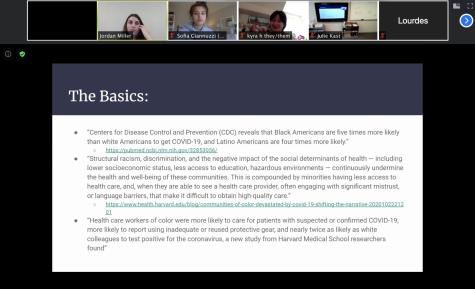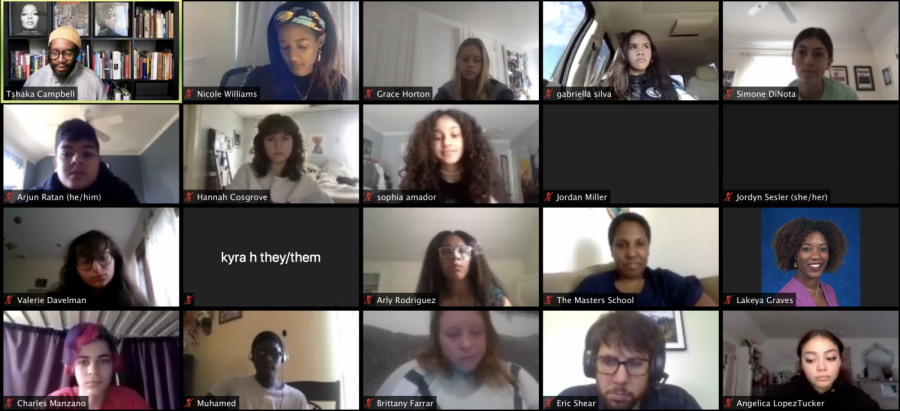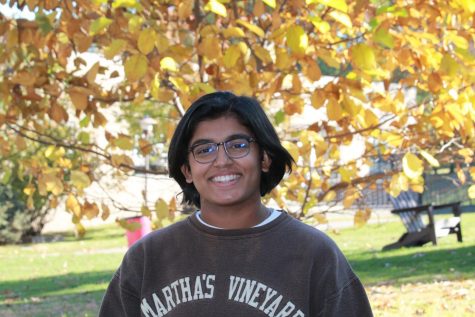Masters co-hosts fourth annual Summit on Social Justice virtually
A screenshot of the fourth annual Saturday Summit on Social Justice, hosted by The Masters School and Rye Country Day. The summit fostered conversations about racial justice, gender and sexuality, and took place over Zoom.
November 21, 2020
The fourth annual Saturday Summit on Social Justice brought students, faculty, and administrators from across Fairfield and Westchester County together this weekend. The event took place on Saturday, Nov. 21 from 10 a.m to 2 p.m and was held virtually for the first time due to the COVID-19 pandemic.
Rye Country Day School (RCDS) and The Masters School co-hosted the summit, which featured student and faculty-led workshops on relevant social justice matters, as well as affinity groups, and a keynote presentation from renowned artist, Tshaka Campbell.
This year’s summit theme was unity. In her opening speech, Masters’ Director of Equity and Inclusion, Karen Brown, emphasized the importance of coming together specifically for this summit in the wake of everything that has happened in 2020, from the global pandemic to widespread racial justice movements.
“We have had a year. So many of us have trudged through 2020, either because of the pandemic or all the social and civil unrest, but this is what makes it all worth it,” Brown said.
The morning began with workshops on a variety of topics, including codeswitching, anti-semitism, mental health, and colorism.
COVID-19 and its impact on historically underserved populations was one workshop new and specific to this year’s summit. The workshop discussed the disproportionate toll the pandemic has taken on Black, Latinx, and indigenous communities. The facilitators, Jordan Miller and Kyra Heffernan, both seniors at RCDS, touched on the misconceptions about COVID-19’s effect on these communities versus what is really happening.
“It’s scary, frankly, that so many people would immediately assume that the higher infection rates in underserved communities have something to do with people’s genetics and not the social barriers that have been harming these communities long before the pandemic,” Heffernan said.

After the morning workshops, attendees heard from this year’s keynote speaker, Tshaka Campbell. Campbell, an award-winning poet, musical artist, and performer, spent his childhood years in and around New York, and currently resides in San José, California with his daughter. Campbell discussed finding his voice, writing poetry, balancing his many identities, and read several of his poems, many of which deeply moved the audience.
Junior Dosi Weed was especially touched by Campbell’s performance and felt his poems were very grounding and emotional.
“His words are so powerful and so heartbreakingly human, and the intimacy of his experiences is so clear through his words,” he said.
Following the keynote, students and adults were sent to separate affinity groups to talk about their collective experiences. There was a wide array of groups, including white, black, Latinx, Asian, Middle Eastern, and multiracial affinity groups, and an LGBTQ+ affinity group.
After a short lunch break, a second round of workshops and affinity groups was held and featured talks about body image, activism, people of color in predominantly white institutions, and more.
Sachi Singh, a senior, facilitated two workshops called “Understanding Privilege” and “Activism vs. Performative Activism.” As a third-time attendee of the summit, Singh was surprised at how well the virtual format worked for her workshops and the event as a whole.
“I was nervous it wasn’t going to be as meaningful over Zoom and people wouldn’t participate as much, but it actually went really well and we were able to have really good discussions,” Singh said.
Masters sophomore Charles Manzano attended his first Saturday Summit this weekend. Along with attending workshops on cultural appropriation and code-switching, he, along with three other Masters students, also facilitated a workshop on toxic masculinity. They discussed the culture surrounding expectations for men and how to break down the stigma behind these expectations. He said he enjoyed the virtual format because it seemed much more accessible and thought that, for everyone, there was so much to be learned from this year’s event.
Manzano said, “I think the most important thing that should be taken away [from the summit] is if we want to tackle these social justice issues, we have to do it together.”




